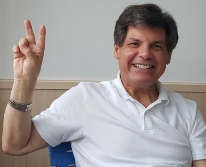 Introspective
Introspective
By
Thomas F. O'Neill
The clash between the Blue states and Red states are culturally evident in the U.S. along with the war between conservatism and liberalism. Other Nations around the globe view this dichotomy as a cultural issue in America.
Being a liberal, conservative, or a moderate reveals how you view yourself in society. In today's, political arena Democrats and Republicans also view themselves in fundamentally different ways.
I have also found that Westerners and Asians see themselves in fundamentally different ways as well.
I always understood that we Americans view ourselves as being individualistic, independent, and analytical, itís due to our cultural history. The Asian cultures take a more holistic view of life, emphasizing interdependence and context which I find intriguing.
In my Cultural Diversity class at the Suzhou International Foreign Language School, in Suzhou, China. I conducted a word game where the students had to pair off a series of words to reveal their cultural views on their relationship with society.
For instance, if the words are train, bus, and tracks, an American with an individualistic/analytical mindset would pair train and bus, since they belong to the same category (modes of transportation). In contrast, a Chinese person from a holistic culture is more likely to pair train with tracks, since they share a functional relationship.
Chinaís history has greatly influenced their cultural perceptions and for thousands of years working the land led to their interdependence with nature. People of Asia, have a higher percentage of farmland devoted to rice paddies they think more holistically than your average American.
If you were to ask a Chinese person to draw a diagram of their social network they would draw a circle emphasizing their friends and acquaintances. In contrast, most Americans would put the emphases on themselves in relation to others due to our own cultural perceptions and assumptions.
Unconsciously, Americans stress the importance of the self and westerners will most likely self-inflate their importance more than those from Asian cultures. On the most part, people born in China wonít inflate their self-worth but on average people born in western cultures do.
For thousands of years growing rice was a labor-intensive crop in Asian countries, dependent upon a complex infrastructure of dikes and canals. This influenced or created a culture that recognizes human interdependence. Most Asians would also view the importance of society over their individual needs.
In contrast, our American history of the frontiersman, hunting, fishing, and growing simple crops has shaped our perception of independence and the rugged-individualistic mindset.
The relationship between people and land helped shape our cultural assumptions, which are then passed down from generation to generation. This is certainly true when it comes to the contrast between the western and eastern cultures.
Our western influence, however, is beginning to have an impact on China and their perceptions about the west. Itís mostly due to the popularity of American films and western music. I am witnessing that among my students and Chinese teenagers in general. They want to become like their counterparts in western countries.
Clearly, there are regions mostly in the large cities of China that have populations that share many basic assumptions with Westerners. Many others, though, are much closer in mindset to people in other rice-cultivating countries such as Japan and Korea.
Itís important to keep in mind the cultural differences between the East and West, especially, as Chinaís influence expands, and our relationship with the nation grows in importance.
China certainly understands the importance of gaining a clearer understanding of our American way of life and it is mostly due to our economic interdependence. Chinaís rising power and influence in the world makes gaining that understanding a necessity not just for China but for Americaís economic wellbeing.
Always with love from Suzhou, China
Thomas F OíNeill
U.S. voice mail: (800) 272-6464
China Cell: 011-86-15114565945
Skype: thomas_f_oneill
Email: introspective7@hotmail.com
Other articles, short stories, and commentaries by Thomas F. O'Neill can be found on his award winning blog, Link:
http://thomasfoneill.blogspot.com
Click on author's byline for bio and list of other works published by Pencil Stubs Online.
|